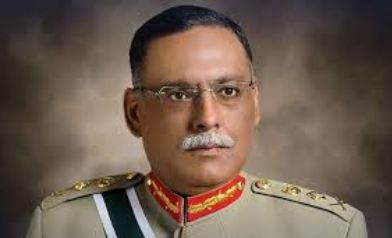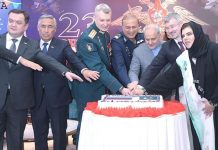“Issues can only be resolved by dialogue… They cannot be resolved on the battlefield,” says most senior army official
Centreline Report
SINGAPORE: Pakistan and India are close to reducing the troop build up along their border to levels before conflict erupted between the nuclear-armed neighbours this month, Chairman Joint Chiefs of Staff Committee (CJCSC) General Sahir Shamshad Mirza said on Friday, although he warned the crisis had increased the risk of escalation in the future.
Both sides used fighter jets, missiles, drones and artillery in four days of clashes, their worst fighting in decades, before a ceasefire was announced.
The spark for the latest fighting between the old enemies was an April 22 attack in Indian illegally Occupied Jammu and Kashmir (IIOJK) that killed 26 people, most of them tourists. New Delhi blamed the incident on Islamabad, a charge denied by Pakistan.
Earlier this month, Pakistan’s armed forces launched a large-scale retaliatory military action, named “Operation Bunyan-um-Marsoos”, and targeted several Indian military targets across multiple regions.
The strikes, described by officials as “precise and proportionate”, were carried out in response to India’s continued aggression across the Line of Control (LoC) and within Pakistan’s territory, which New Delhi claimed were aimed at “terrorist targets”.
Pakistan downed India’s six fighter jets, including three Rafale, and dozens of drones. After at least 87 hours, the war between the two nuclear-armed nations ended on May 10 with a ceasefire agreement brokered by the United States.
The CJCSC said the two militaries had started the process of drawing down troop levels.
“We have almost come back to the pre-22nd April situation… we are approaching that, or we must have approached that by now,” said Gen Mirza, who is the country’s most senior military official to speak publicly since the conflict.
India’s ministry of defence and the office of the Indian chief of defence staff did not immediately respond to Reuters’ requests for comment on the remarks by the military general.
Gen Mirza, who is in Singapore to attend the Shangri-La Dialogue forum, said while there was no move towards nuclear weapons during this conflict, it was a dangerous situation.
“Nothing happened this time,” he said. “But you can’t rule out any strategic miscalculation at any time, because when the crisis is on, the responses are different.”
He also said the risk of escalation in the future had increased since the fighting this time was not limited to the disputed territory, the scenic region in the Himalayas that both nations rule in part but claim in full. The two sides attacked military installations in their mainlands but neither has acknowledged any serious damage.
Indian Prime Minister Narendra Modi warned Pakistan this month that New Delhi would target “terrorist hideouts” across the border again if there were new attacks on India.
‘Dangerous trend’
The two countries have fought three major wars, two of them over the Kashmir dispute, and numerous armed skirmishes since both were born out of British colonial India in 1947.
India blames Pakistan for an insurgency in IIOJK that began in 1989 and has killed tens of thousands. Islamabad says it provides only moral, political and diplomatic support to Kashmiris seeking self-determination.
“This [conflict] lowers the threshold between two countries who are contiguous nuclear powers… in the future, it will not be restricted to the disputed territory. It would come down to [the] whole of India and [the] whole of Pakistan,” Gen Mirza said. “This is a very dangerous trend.”

















